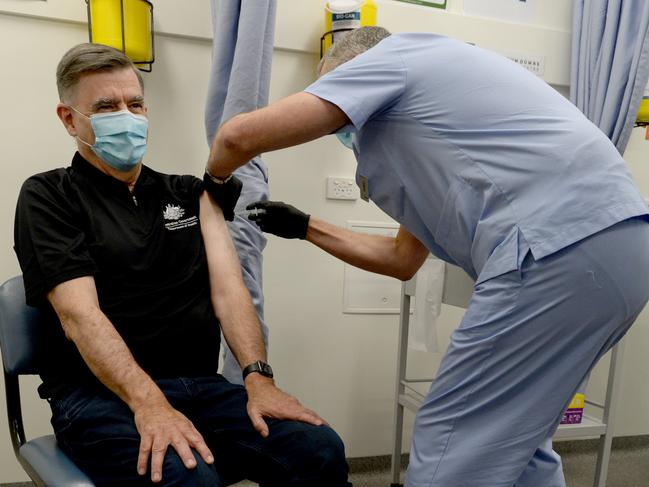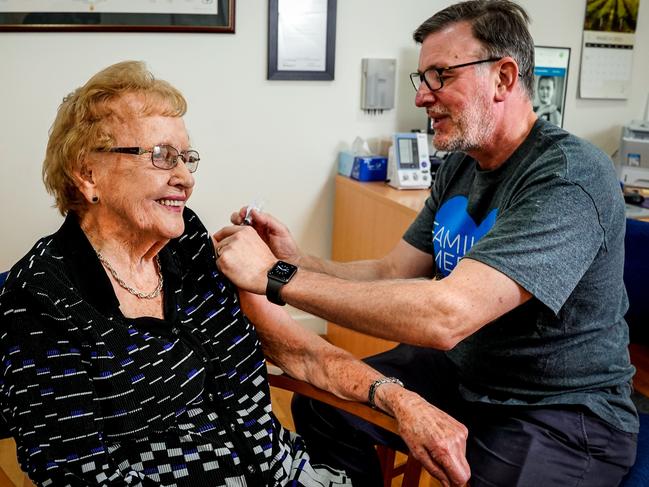James Campbell: Australia’s COVID success may stop people getting vaccinated
The odds of catching COVID in Australia are basically zero, so people may decide the tiny chance of an adverse reaction to the vaccine is not worth the risk, writes James Campbell.
News
Don't miss out on the headlines from News. Followed categories will be added to My News.
It goes without saying that the people running Australia’s vaccination program would have preferred to avoid issuing a warning to people who have had the AstraZeneca shot that they need to be on the lookout for severe headaches and abdominal pain between four and 20 days after their vaccination.
Unfortunately, they had no choice.

When the first reports appeared of unusual clots occurring in people who had recently been vaccinated, it was reasonable to dismiss them as statistical anomalies.
But as the number of cases, some fatal, has slowly mounted around the world, the message from authorities has changed.
Now we are told that while a causal relationship has not been established definitively, we are all to be on the lookout for these symptoms.
The authorities are rightly keen to stress these cases are extremely rare.
According to Professor Brendan Murphy “perhaps 1 to 2 per million if you look at the UK”, whereas “the risk of dying of COVID is 1 to 2 per 100”.
The problem is that even if both those ratios turn out to be correct — and the Germans think the rate is more like 1 in 100,000, while the risk of dying from COVID might well be two-in-100 if you catch the coronavirus — the chances of catching COVID in Australia at the moment is basically zero.
So while for just about everywhere else in the world Murphy’s choice works on the side of vaccination, it doesn’t here.
That there might be a problem with the take up of the AstraZeneca vaccine was becoming clear even before the clotting problem appeared, with reports healthcare workers who were eligible for it were holding out to be given Pfizer.
This wasn’t a safety thing, it was a recognition that Pfizer’s vaccine works better. And that was before the evidence started arriving there might be differences between the effectiveness of the vaccines in dealing with the South African variant that has everyone spooked.

According to a study last month in the New England Journal of Medicine, two doses of the AstraZeneca vaccine were found to have only a 10.4 per cent efficacy against mild-to-moderate infections caused by the South African variant.
If you are a public health official overseas, how much protection a vaccine gives against mild-to-moderate infection is very much a secondary matter to how much protection it gives against severe illness and death.
And the good news on that front is that on the evidence so far all the vaccines work.
But in Australia our situation is different.
The big decision our authorities are going to have to make in the next year or so is what level of protection is good enough for us to reopen our borders.
Are we prepared to live with mild-to-moderate illnesses as the price of getting back to normal or are we going to have a higher bar?
In the past week plenty of people have observed that while we were world beaters last year with our successful elimination of the virus, we risk failing badly in the race to vaccinate. What fewer people seem to have grasped is that Australia’s vaccination program is at risk in part precisely because of our success in eliminating the virus.
At the moment the problem is we don’t have enough of either the Pfizer or AstraZeneca vaccine for everyone who wants to get it.
People can attribute blame here if they want, but this isn’t really the government’s fault: it has taken CSL longer than expected to start making the AstraZeneca vaccine here and then we were hit with export bans from the Europe.
When it starts rolling in bulk off the production line in Melbourne we will get an answer to the other great question of recent days, whether or not it was wise of the government to use GP clinics — and eventually pharmacies — to vaccinate the bulk of the population.
The government is still convinced they are on track to have every adult given at least one jab by October.
Given how things have tracked so far, this target would appear to be receding into the distance, although it will probably be a while before they admit the goalposts are going to have to move.
For argument’s sake, let’s assume we will be lucky to get one jab into everyone by Christmas.
Given that the AstraZeneca second shot needs to be delivered 12 weeks after the first, we could be waiting until March next year before the adult population is covered.
At which point it will also have become clear just how many people have decided that on balance, they’re a thanks-but-no-thanks to the vaccine altogether, and how many are prepared to wait for one that is not AstraZeneca’s.
The good news is that if reports from overseas are correct, by then we could be spoiled for choice, with experts in the US predicting that by the second half of the year there could be a vaccine glut.
Not only is Pfizer ramping up production by then, fingers crossed Novavax, the other one we’ve ordered, should also be available.
Meanwhile, we need to answer two questions. Are we prepared to live with the coronavirus as long as people aren’t dying? How many people will need to be vaccinated before we let it back in?
Originally published as James Campbell: Australia’s COVID success may stop people getting vaccinated


